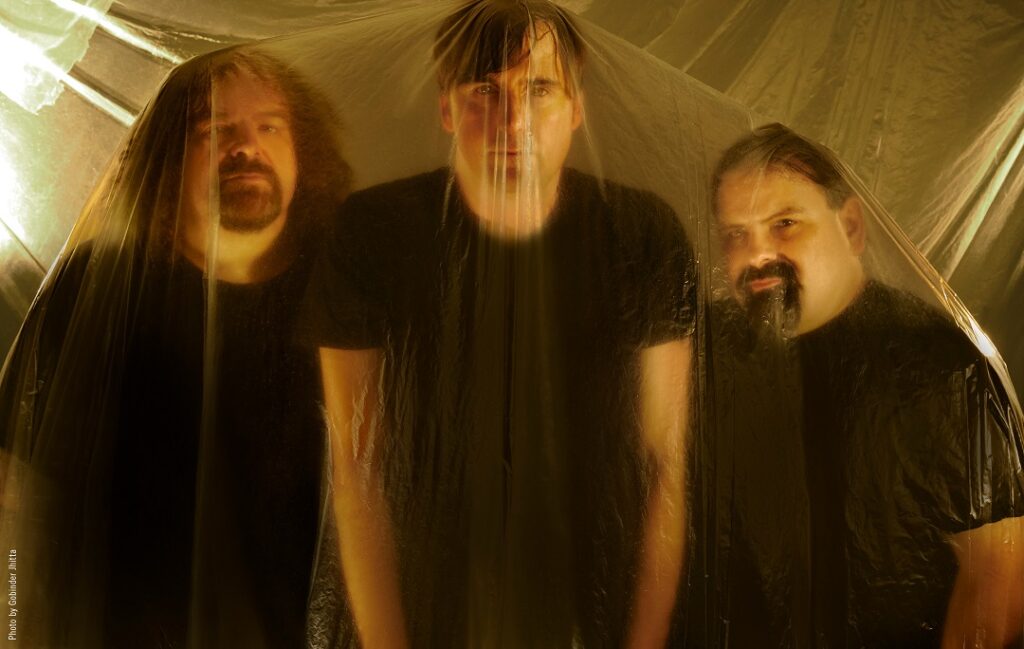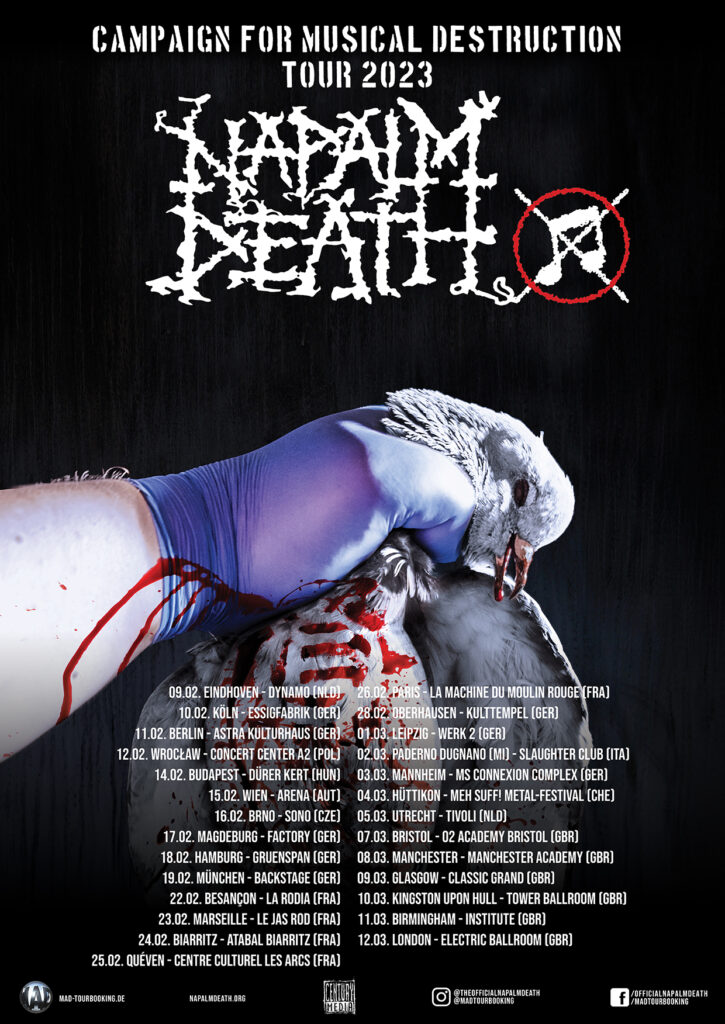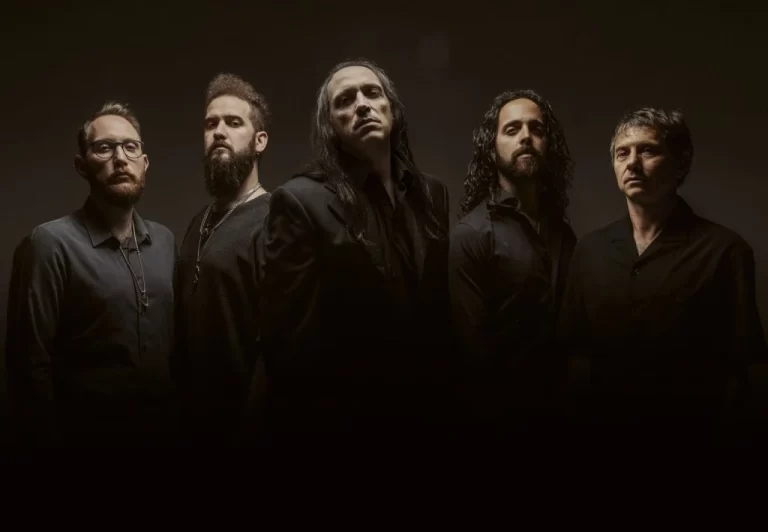It’s Saturday afternoon at Download and the press tent, normally a refuge from the rain, is sweltering. Several rows of tables are set up, and a cacophony is rising from the assorted throng of musicians, press and harried PR people, who race from one interview to another to ensure they don’t run over time. I’m perched at a table, fiddling nervously with my notes prior to an interview with Barney of Napalm Death. Despite following the band for years, it’s my first time meeting a member, and I find myself surprisingly nervy.
It takes about five seconds from Barney arriving for that sense to dissipate. An awesome and commanding presence on stage, he’s softly-spoken and courteous off-stage, taking the time to think about each question and giving detailed answers, despite the fact that the clock is clearly ticking. At the same time, there’s an electrifying undercurrent to Barney’s answers. Where some artists stick to the script, so to speak, there’s a sense that when you interview Barney, he answers with the same honesty that informs his lyrics and his music. It makes for a really interesting interview and I am surprised, when I look at my Dictaphone, that a mere eight minutes passed in his company.

Napalm Death is known for being an extreme band, but one of the things, I think, that keeps fans coming back is the way that the band evolves from album to album – particularly the last album and, of course, the recent EP, which was really experimental. How do you feel about the artistic growth of the band?
Yeah, you know, for us it’s always been a question of what’s the point of making the same album twice, three times, four times over. That’s the easy way, you know. Part of being confrontational, musically, and part of being abrasive musically is to be adventurous. We’re not a formula band. We’re not fitting to some concept of the perfect pop song – that’s not what we do. We’re an art band. We care about our art and we want to make it the best we can. We want to throw a few curve balls in there. Of course, it’s still got to be abrasive, but there are surprises. So, somehow, we end up with something that seems to have moved on from whatever we did last.
On the last album, you had some really interesting covers – I’m a massive Sonic Youth fan, so White Kross was so cool to hear…
Yeah, we love Sonic Youth!
It’s a perfect connection, I think.
Yeah, yeah. Sonic Youth is a big influence on Napalm Death. That’s the thing, we take our influences very much from outside of what you might consider something that would be eligible for this festival. A large percentage of Napalm’s influences are from outside, you know, of the traditional sort of thing. And I like that. There’s something about it that keeps it exciting.
Sonic Youth, I think, in the same way as you, had the stance of being on the activist side, but they were quite oblique with it too. Apart from Youth Against Fascism – they very rarely put things too obviously out there, but you knew where they stood.
Yeah, well – Napalm is very direct, but we use creative writing. So, it’s not… I’m not trying to be more direct or less direct – that’s not the way I write. I just write creatively and what comes out comes out. But, of course, it has that definite undertone of human ideals. That’s what it is.
But also, people who say [about us] “very political band” – well, yes and no. We’re actually apolitical. We understand that human ideas transcend politics. Politics is meaningless if you can’t move the human race forward in terms of its survival. It’s survival within itself. Within it.
That’s really important when trying to write lyrics on these themes, because there’s a big difference between “think for yourself” and “think for yourself, but…” and it becomes an instruction.
Yeah. I’m not here to hit people with a big fucking stick, definitely. Because, one of, I guess, the movements that kind of drove me down this path was the anarchist-punk movement – Crass, Conflict and bands like that. They always said “we’re not a political band, we are about human ideas” – I’m paraphrasing, you know. They would say “surely, if our whole emphasis is on freedom, we’re not following that by telling you what to think” – you know what I mean?
Absolutely, and it’s a really important of creating music in this arena. But, at the same time, when you’re writing lyrics, it’s not always an easy line to tread. Do you find there are times when you write something and feel you have to row it back, or has that never been an issue?
No, I’ve never self-censored. Neither would I. I refuse that. If anyone tells me – no. No, no, no. Absolutely not. If I write something and I end up with that finished lyric, and I’m happy with the thrust of it, then no. I would never pull myself back from any kind of presence. I don’t feel the need to.

One of the things that I find interesting is that, while the music is extreme, the message is still very hopeful and very human, where I think it’s so easy to go down that more nihilistic route.
Yeah! We’re juggling negatives, but the desired end result is always positive. That’s the way we look at things. The liberation of human beings; of sentient beings – you can’t get more positive than that, I would suggest.
And that goes hand in hand with your relationship with the audience – because Napalm Death have an incredibly inclusive audience, which is amazing.
Yeah. Yeah, hopefully. I would wish that for every band across the world. But yeah, I know I’m banging the drum here a little bit, but I’m a human being. I care for other human beings. I don’t treat one human being differently from another. That’s my default position, so therefore that’s what I’m going to do. That’s how I conduct myself. I try to make my life go, as much as I have the power to influence things outside my own universe.
Yeah – and I remember reading an interview that you gave and one of the quotes that totally stuck in my head was something along the lines of “I don’t want to punch a fascist – I want to sit down and have a dialogue with them”…
I would rather…
And that’s so different from much of the behaviour we see on social media.
Yeah – you see, perpetuating violence on the streets, if you want to boil it down to that, that’s… I almost feel sometimes that people misunderstand, and they think that it’s necessary to continue fighting against it, literally physically. But surely, we don’t want that in the end. What we want is to come to a consensus. That’s what we want to do.
Yeah, I mean back in the day, definitely. As much as a lot of other people, I was quite willing to smack people, sometimes in self-defence and to get myself out of situations.
So be it.
But I can’t glorify that. It would be really wrong to glorify that, it’s just miserable. So, yeah… You know, at the same time, I recognise that, as a human being, I still struggle with it. I wrestle with it. Because, if someone comes in here and starts Sig heil-ing, well, deep inside in me, my inner-self is going to be telling me “go and punch that guy in the fucking face!”
But, of course, I realise in the long term that it’s not going to do anything. It’s not going to stop anyone form victimising people on the streets or public transport.
My final question, I know you’ve worked with Russ Russell for many years – a great producer and human being – and obviously, the new EP there’s a really interesting piece of electronica on the final track and I was wondering how much of that was his influence, because I know that Shane is really into electronica as well.
Yeah, we all are. Again, we all bring those elements into our music. At certain points, people outside the band have been a bit “oh, electronic music…” but, it can be abrasive and, actually really extreme… And we like it, so we’re going to do it. If it sticks, we’ll do it and if it doesn’t, we won’t. But it’s what we wanted to do, and it’s as good as we could make it, so – go for it, take it away with you and see what you think.



